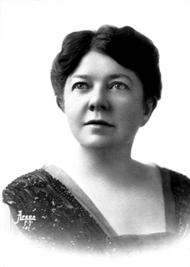 Amy Beach (1867-1944) was an exceptional musical prodigy. Gifted with perfect pitch and impeccable memory she was able to accurately sing 40 songs by age one. She taught herself to read at age three, and composed a number of dances at age 5. She took formal piano lessons with her mother at age 6 and gave public recitals at age 7. Even as a young child she knew “no other life than that of a musician could ever have been possible for me.” Yet, her parents did not support a professional music career for their daughter. Amy did give her debut concert at the Boston Music Hall in 1883, however, in terms of composition she was essentially self-taught. Once she married a Boston surgeon, Amy agreed to limit performances to one public recital a year, and following her husband’s wishes, devoted herself more to composition. During her 25 years of marriage she composed a symphony and a piano concerto alongside songs, chamber, choral and music for solo piano. Widowed at 43, she went to Germany to present her compositions and revive her career as a pianist, under the name Amy Beach. On her triumphant return to Boston in 1914, she devoted herself to concert tours and composition, completing the balance of her three hundred works, almost all published and performed.
Amy Beach (1867-1944) was an exceptional musical prodigy. Gifted with perfect pitch and impeccable memory she was able to accurately sing 40 songs by age one. She taught herself to read at age three, and composed a number of dances at age 5. She took formal piano lessons with her mother at age 6 and gave public recitals at age 7. Even as a young child she knew “no other life than that of a musician could ever have been possible for me.” Yet, her parents did not support a professional music career for their daughter. Amy did give her debut concert at the Boston Music Hall in 1883, however, in terms of composition she was essentially self-taught. Once she married a Boston surgeon, Amy agreed to limit performances to one public recital a year, and following her husband’s wishes, devoted herself more to composition. During her 25 years of marriage she composed a symphony and a piano concerto alongside songs, chamber, choral and music for solo piano. Widowed at 43, she went to Germany to present her compositions and revive her career as a pianist, under the name Amy Beach. On her triumphant return to Boston in 1914, she devoted herself to concert tours and composition, completing the balance of her three hundred works, almost all published and performed.
Amy Beach: Piano Concerto, Op. 45
 Her piano concerto originated in Boston between September 1898 and September 1899. The first public performance on 7 April 1900 featured the composer as soloist, and the critic Philip Hale wrote that it was “a disappointment in nearly every way.” Undeterred, Beach would subsequently play her concerto in Chicago, Philadelphia, Leipzig, Hamburg, and Berlin. Eventually, opinions changed and the work was praised as an overlooked masterwork. A San Francisco critic writes, “Its four movements are packed with incident—beautifully shaped melodies (several of them drawn from her songs), a forthright rhythmic profile and a vivacious and sometimes contentious interplay between soloist and orchestra. The piano part is as flashy and demanding as a virtuoso vehicle calls for, but there is also an element of poignancy about it, a sense of constraint that seems to shadow even the work’s most extroverted passages.”
Her piano concerto originated in Boston between September 1898 and September 1899. The first public performance on 7 April 1900 featured the composer as soloist, and the critic Philip Hale wrote that it was “a disappointment in nearly every way.” Undeterred, Beach would subsequently play her concerto in Chicago, Philadelphia, Leipzig, Hamburg, and Berlin. Eventually, opinions changed and the work was praised as an overlooked masterwork. A San Francisco critic writes, “Its four movements are packed with incident—beautifully shaped melodies (several of them drawn from her songs), a forthright rhythmic profile and a vivacious and sometimes contentious interplay between soloist and orchestra. The piano part is as flashy and demanding as a virtuoso vehicle calls for, but there is also an element of poignancy about it, a sense of constraint that seems to shadow even the work’s most extroverted passages.”
You May Also Like
- Unsung Concertos
Mieczysław Karłowicz: Violin Concerto in A Major, Op. 8 Mieczysław Karłowicz (1876-1909) met his end in a rather unusual way. - Unsung Concertos
Franz Xaver Scharwenka: Piano Concerto No. 1, Op. 32 As far as composers go, Franz Xaver Scharwenka (1850-1924) is not necessarily a household name. - Unsung Concertos
Joachim Raff: Cello Concerto No. 1, Op. 193 Today, the German-Swiss composer Joachim Raff (1822-1882) is primarily remembered as an assistant to Franz Liszt in Weimar. - Unsung Concertos
Ernst Sachse: Concerto in F Major for Bass Trombone The modern era of the trombone as a solo instrument began on 6 April 1815, when Friedrich August Belcke performed a potpourri with obbligato trombone by Carl Heinrich Meyer with the Gewandhaus orchestra in Leipzig.
More Anecdotes
- Bach Babies in Music
Regina Susanna Bach (1742-1809) Learn about Bach's youngest surviving child - Bach Babies in Music
Johanna Carolina Bach (1737-81) Discover how family and crisis intersected in Bach's world - Bach Babies in Music
Johann Christian Bach (1735-1782) From Soho to the royal court: Johann Christian Bach's London success story - A Tour of Boston, 1924
Vernon Duke’s Homage to Boston Listen to pianist Scott Dunn bring this musical postcard to life
